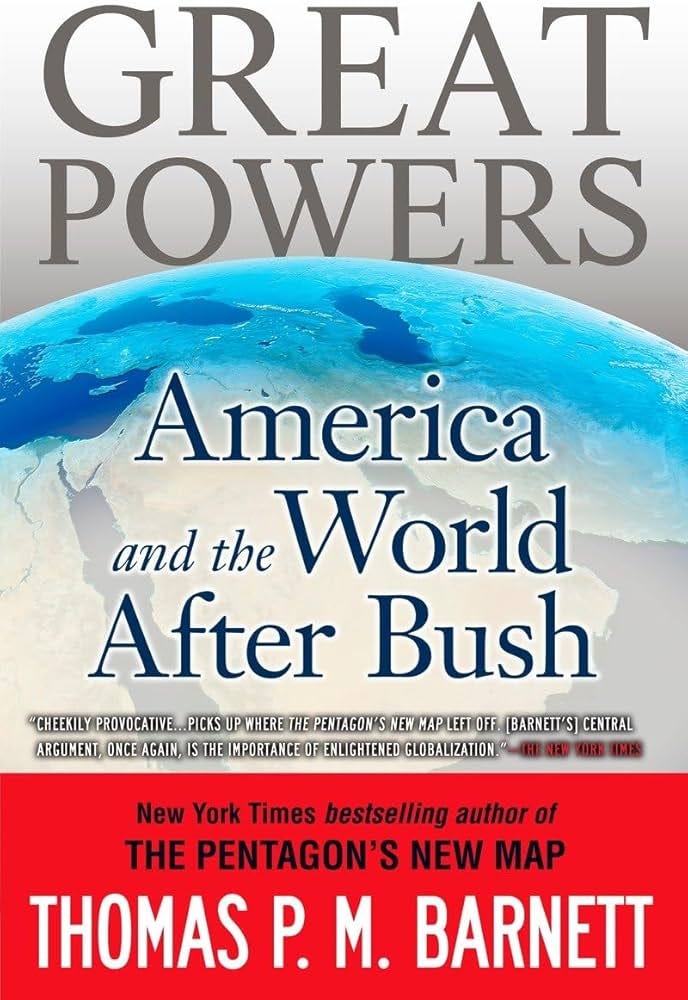[POST] Was I calling for Trump all along?
A 2013 review of my 2009 "Great Powers: America and the World After Bush," now revisited, uncomfortably portrays me calling more for a Trump versus a Dem
This is a reader-supported publication. I give it all away for free but could really use your support if you want me to keep doing this.
Consider this a teaser for my Monday newsletter, which excerpts the British Marxist historian Perry Anderson’s 2013 double-essay for the New Left Review entitled “American Foreign Policy And Its Thinkers.” It later became a book in 2016 and paperback in 2017 — so completely pre-Trump in its outlook and analysis, which is what makes Anderson’s treatment of me so … surprisingly uncomfortable pour moi today.
Anderson has dueling chapters on the Idealists (Walter Russell Mead, Michael Mandelbaum, John Ikenberry, and Charles Kupchan) and Realists (Robert Kagan, Zbigniew Brzezinski, and Robert Art) in US grand strategic thinking, and then follows that up with a third chapter entitled “Economy First,” where the entire chapter, save for two paragraphs on Richard Rosecrance, discusses Great Powers as a singularly orthogonal take on US grand strategy — at odds with both of the classic schools.
Naturally, I took this extensive treatment as a great honor, given my respect for Anderson as a world-class essayist, and so I wanted to reintroduce it here for the record (my record, really, as I fear the disappearance of things on the web — and my memory). But, I have to say, after listening to my podcast version of the post (both come out overnight tonight), I found myself wondering if, in getting me “so right” (Marxian but not Marxist in that I see capitalism as the primary driver of global change — not democracy), Anderson actually reveals me to be someone who, in retrospect, should have been (and still be) far happier with a Trump in the White House than a Biden or Harris.
I honestly have to ask myself if Anderson himself would naturally come to the same conclusion, because, the way he describes my thinking and principles, they seem to better presage Trump’s capitalist-crazy deal-making-first approach over the more principled and traditional (largely realist) foreign policy of Biden/Harris.
I can actually imagine Anderson linking Trump more to me and the “Economy First” school of thought far more logically than to either the Wilsonian Idealists or the Nixonian Realists.
Here is the problem someone like me faces: domestically, I am dyed Blue, but in foreign affairs I am more Red than Blue, meaning here that I suffer the fate of opposing (vehemently) Domestic Trump while —unconsciously perhaps —advocating for Foreign Policy Trump — not every little point but the general thrust of “realignment” that is the throughline of my book Great Powers.
You could say that’s always my problem with Republican presidents, while that problem-set being reversed whenever we have Democratic presidents. It’s just that I have long considered Trump to be a total one-off and fundamentally unrepresentative of true American conservatism of the modern era (which is why analysts are forced to go back to the 19th century presidencies of Jackson and McKinley for reference points).
So, in looking back at what I called for in terms of correcting the course of US grand strategy post-Bush, I find myself now admitting — somewhat — that the book, at its core message, did not call for Obama or Biden but came closer to calling for a Trump-like transformer (absent the Cultural Revolution at home).
Anyway, I’ll be interested in how readers interpret tomorrow’s post on that basis, particularly my economic determinism on both Russia and China.
Meanwhile, I’ll contemplate whether or not the Trump Transformer of foreign policy was doomed to come in from the Right and thus necessarily came burdened with the whole Cultural Revolution pairing domestically.
Hmmm.
Goddamn Marxists always make me uncomfortable in my thinking, which, of course, is why I value them so much as an intellectual framework.






